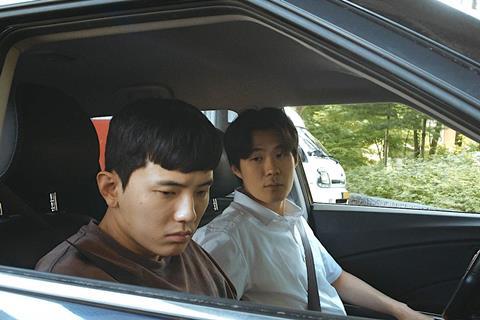Three lives intersect in a welfare office in Korea in Lee Jong-su’s droll, dry debut

Dir: Lee Jong-su. Korea. 2023. 101mins
In the silent opening of Heritage a young man looks through a pair of coin-operated binoculars, zooming in on the town below. It is a maneouvre that offers a hint of the tale to come, which will ultimately zero in on the lives of three Koreans, each from a different generation. Lee Jong-su’s debut feature is an unhurried affair whose bone-dry comedic elements gradually make themselves felt in a meandering narrative that gains traction as it goes along. The film’s droll attitude towards the interplay between the generations coupled with some stylistic flourishes from Lee could be its passport to further festival play.
A meandering narrative that gains traction as it goes
The life of Paik Jin-hyun (Yoon Hyeok-Jin) is the intersection point for Lee’s three characters. The 35-year-old lives what he describes as a “lukewarm life” as a welfare officer, going through the motions at work before heading home to an empty house for a few cans of beer and some gaming until it is time to sleep. One of his duties is to oversee the work of the younger Im Young-jin (Ahn Eun-soo), who is conscripted at the welfare centre as an alternative to military national service. Jin-hyun’s dismissive colleague brands Young-jin “a delinquent” because of his poor time-keeping but when the older man realises the youngster is sleeping under a motorway bridge, he finds himself offering him a bed for the night that soon turns into a regular habit. This leads to a comedic nightly ritual in which Jin-hyun basically directs a monologue blend of mild “kids these days” style admonishment and self-pity at Young-jin, made all the more humorous by Ahn’s taciturn and deadpan portrayal of the younger man.
At the opposite end of the age spectrum is Sun-rye (Na Ho-sook), an elderly woman who is trying to claim welfare from Jin-hyun. Though sympathetic, he points out that she is not entitled to benefits because her son has a high-powered job and she should, therefore, be approaching him for help. In a beautifully worked scene between the two of them, Sun-rye moves from lamenting her son’s failure to return her calls to being proud of the fact as it indicates how important he is. And in one of the tragi-comic high points that pepper the film, she tells Jin-hyun, “Unlike you, my son is exceptional”.
This mixture of expectation and debt between the generations is the key theme of Lee’s movie, as Young-jin’s homelessness mirrors that of Sun-rye’s poverty as it comes as a result of being kicked out of his moneyed father’s house. But if his film highlights the failures of the intergenerational contract, it also has a humanistic eye for the non-blood ties that can form in unexpected places.
The structure of Lee’s film is deliberately, even defiantly, odd. After taking us through the quotidian goings-on for a while, he breaks away to focus on each of the three characters in turn, fleshing out their back stories. Young-jin’s tale also explains how he comes to be in possession of a small video camera, footage from which Lee also uses periodically, offering us a tiny window into whatever the young man is focused on at the time.
There are some longeurs, especially during the evenings spent with Jin-hyun and Young-jin, where the humour quotiant isn’t quite sufficient to justify the repetition. But when the mirroring of scenes works, as is the case with references to two sets of birthday celebrations, Lee is able to produce poignant emotion from out of the blue. His ambitious intentions may not quite be matched by delivery yet, but they bode well for his future work.
Production company/international sales: Borisunamu, borisunamu23@gmail.com
Producer: Jeong Bo-ra
Screenplay: Lee Jong-su
Cinematography: Choi Yoo-seung
Editing/music: Lee Jong-su
Main cast: Hyeok Jin-yoon, Ahn Eun-soo, Na Ho-sook















![[L-R]: Amanda Villavieja, Laia Casanovas, Yasmina Praderas](https://d1nslcd7m2225b.cloudfront.net/Pictures/274x183/6/4/1/1471641_pxl_20251224_103354743_618426_crop.jpg)








